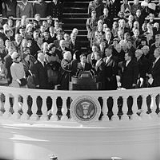
John F. Kennedy 1961 presidential inauguration
Encyclopedia
Inaugural Address and Interpretation
Kennedy's inaugural address was the fourth-shortest inaugural address ever delivered, taking 13 minutes 59 seconds from first word to last word. The speech emphasized several themes: regular public service, which was later realized through the administration's Peace CorpsPeace Corps
The Peace Corps is an American volunteer program run by the United States Government, as well as a government agency of the same name. The mission of the Peace Corps includes three goals: providing technical assistance, helping people outside the United States to understand US culture, and helping...
effort, cooperation with Latin America, under the umbrella of what Kennedy referred to as "a new Alliance for Progress
Alliance for Progress
The Alliance for Progress initiated by U.S. President John F. Kennedy in 1961 aimed to establish economic cooperation between the U.S. and South America.-Origin and goals:...
", and an increased emphasis on manned space exploration, culminating in landing of humans on the Moon initiated later in Kennedy's presidency.
The youthful and refreshing energy found in John F. Kennedy’s speech is extremely evident throughout. The goals he illustrates appeal to strong emotion and effectively make a connection with everyday Americans. Kennedy begins by talking about all that he has to deal with as president and as a global icon striving for peace. He says, "I do not shrink from this responsibility - I welcome it," near the end of the speech, showing his persistence as a leader. He allows listeners to hear the strength of this determination in his words. He shares his energy with the people, stating that the goals of a better world require that effort is given by everyone. His ultimate goal of peace between opposing forces is shown through his idea to, "bring the absolute power to destroy other nations under the absolute control of all nations." He stands strongly before those who are scared and tries to prove to the public that someone is out there who is not afraid to negotiate for peace. Calling people into action makes up a lot of his speech. He wants citizens ask themselves how they can help out the situation. He firstly says what not to do, and then he tells America what should be done. He lists many ideas together when it's necessary, for example, when he comments on the common struggle of mankind as the struggle against, "tyranny, poverty, disease, and war itself.”
Kennedy uses many metaphors to appeal to his audience. For example, he uses a metaphor here to bond with the Southern nations, "to assist free men and free governments in casting off the chains of poverty." His goal of liberation becomes even more evident with the use of this metaphor as well. He also shows that the injustices of the past will not be repeated freely with another metaphor. He refers to dictators of the past saying, "those who foolishly sought power by riding the back of the tiger ended up inside," clearly shows his intentions of becoming a peaceful and just figure on the international level. His formal delivery creates a sense of national pride especially in referring to past Americans as "forebears," which is a sign of respect.
Inaugural Address: Famous Quotations
“So let us begin anew--remembering on both sides that civility is not a sign of weakness, and sincerity is always subject to proof. Let us never negotiate out of fear. But let us never fear to negotiate. Let both sides explore what problems unite us instead of belaboring those problems which divide us.”“And so, my fellow Americans: ask not what your country can do for you--ask what you can do for your country.”
“My fellow citizens of the world: ask not what America will do for you, but what together we can do for the freedom of man.”

